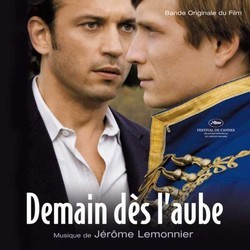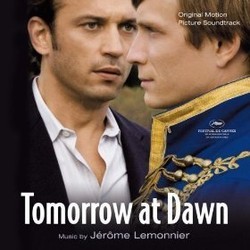Demain dès l'Aube
Colosseum (4005939813123)
Película | Fecha de estreno: 10/08/2009 | Estreno de película: 2009 | Medio: CD, Descarga
¡Subscríbete!
¡Manténgase informado y obtener mejor acceso a la información de los coleccionistas!
¡Manténgase informado y obtener mejor acceso a la información de los coleccionistas!
| # | Pista | Duración | |
|---|---|---|---|
| 1. | Ouverture | 2:27 | |
| 2. | Nocturne | 1:44 | |
| 3. | Le piano d'enfance | 1:59 | |
| 4. | États d'âme | 2:04 | |
| 5. | Intermède | 0:54 | |
| 6. | Dans la forêt | 1:50 | |
| 7. | Nuit au bivouac | 1:43 | |
| 8. | Concert au château | 1:47 | |
| 9. | Le dîner | 1:23 | |
| 10. | Dans une heure au pré aux loups | 2:03 | |
| 11. | Étude de Christelle | 2:58 | |
| 12. | Duel | 1:39 | |
| 13. | Grande sonate | 1:29 | |
| 14. | Dans la chambre d'hôpital | 1:48 | |
| 15. | Thème de Mathieu (Piano et Alto) | 0:54 | |
| 16. | Demain dès laube | 3:30 | |
| 17. | Dix pas chacun | 2:06 | |
| 18. | Épilogue | 1:08 | |
| 19. | Générique de fin | 3:43 | |
| 20. | Thème de Mathieu | 1:30 | |
| 38:39 |
French Synopsis:
La relation de 2 frères dont le plus jeune est passionné de batailles historiques, au point d’être coupé de la réalité et de ne plus vivre qu’à travers les jeux de rôles. A la demande de leur mère, Mathieu, l’aîné, va tenter de sortir Paul de cet univers mystérieux et secret où la frontière entre jeu et réalité n’existe pas toujours. Pour y parvenir, il n’aura d’autre choix que d’y plonger à son tour…
'Those who assume classical musicians are sissies may have to adjust their thinking after Tomorrow At Dawn, in which classical music meets historical battle re-enactments to excellent effect.......The film starts involvingly with a cluster of men in late 18th century military attire preparing for a swordfight in a misty field. The effort expended by the two adversaries, punctuated by the clang of metal, is thrilling. One opponent draws blood. Cut to a contemporary setting in which concert pianist and composer Mathieu (Vincent Perez) is giving a piano lesson in the tasteful salon of the apartment he shares with his wife and young son. After the lesson, he drives to the suburban Paris house where his seriously ailing mother (Françoise Lebrun) lives with Mathieu’s younger brother Paul (Jérémie Renier). She will soon leave for a long hospital stay and knows Paul’s emotional stability depends on Mathieu’s support in her absence. Paul works in a warehouse but devotes all his spare time to a clandestine battle re-enactment group centred on two regiments of Emperor Napoleon’s forces. To say that participants are deadly serious about dressing up and pointing vintage weapons at each other while speaking in the ultra-formal language of a bygone France would be an understatement.
In a deftly written series of interactions, Mathieu attends a weekend bivouac and suits up to humour his brother, only to find himself implicated in matters of honour whose ramifications go far beyond play-acting. Perez, who has several important costume pictures to his credit (Queen Margot, Cyrano De Bergerac, Fanfan La Tulipe) looks well in uniform and handles vintage weapons with flair, in addition to playing short piano passages well enough to convince as an acclaimed pianist. His elegant manners and controlled anger contrast well with Renier’s boyish enthusiasm. Aurelien Recoing is spot-on as a military commander not easily satisfied. Straightforward but effective widescreen filming and editing keep several emotional layers percolating simultaneously. Dercourt doles out information in gradual doses, toggling back and forth between the demands of the Napoleonic Wars and the obligations of everyday life, until the two are intertwined on a level that demands action............As with Dercourt’s five previous features, the musical score is perfectly chosen and smartly applied.' http://www.screendaily.com/
Jérôme Lemonnier about his composition:
“There are in Demain dès l’aube (Tomorrow at Dawn) several opposing forces complementing each other: passion and boredom, infancy and adulthood, the real world and the virtual world…The result of these forces is a sort of wandering, an uncertainty, which makes Mathieu an enigmatic and irresolute character. These are the feelings, their evolution and their outcome that I primarily wanted to emphasise using music.”
Denis Dercourt about Jérôme Lemonnier:
Jérôme Lemonnier has an innate sense of cinema. He knows how to tell stories like no other person. His music comes from worlds where it touches you with wonder and from where you return changed a little each time. As far as he is concerned there isn’t insignificant or grand music, as is the same way for me, there isn’t an insignificant or magnificent story. What is important is the tension, the pleasure and the emotion it transmits. Our joint venture lasted several months and I’m not sure anymore which came first. Was it the pictures or perhaps the music? I am very fond Vladimir Jankélévitch’s saying: “It is possible to live without philosophy, without music, without joy and without love. Just not as well.” This applies perfectly to Jérôme’s music. Life is so much better with it!
Biography Jérôme Lemonnier
Equipped with a solid classical training – composition classes at the Conservatoire National de Musique de Paris, piano studies at the École Normale de Musique - Jérôme LEMONNIER has worked for theatre, television (credits, background, series, etc), advertising, multi-media and song, collaborating as a composer or arranger, with many international artists. In 2006, he composed the music for the film The Page Turner, directed by Denis DERCOURT and nominated for a César in 2007, and also nominated at the Ghent International Film Festival 2007
La relation de 2 frères dont le plus jeune est passionné de batailles historiques, au point d’être coupé de la réalité et de ne plus vivre qu’à travers les jeux de rôles. A la demande de leur mère, Mathieu, l’aîné, va tenter de sortir Paul de cet univers mystérieux et secret où la frontière entre jeu et réalité n’existe pas toujours. Pour y parvenir, il n’aura d’autre choix que d’y plonger à son tour…
'Those who assume classical musicians are sissies may have to adjust their thinking after Tomorrow At Dawn, in which classical music meets historical battle re-enactments to excellent effect.......The film starts involvingly with a cluster of men in late 18th century military attire preparing for a swordfight in a misty field. The effort expended by the two adversaries, punctuated by the clang of metal, is thrilling. One opponent draws blood. Cut to a contemporary setting in which concert pianist and composer Mathieu (Vincent Perez) is giving a piano lesson in the tasteful salon of the apartment he shares with his wife and young son. After the lesson, he drives to the suburban Paris house where his seriously ailing mother (Françoise Lebrun) lives with Mathieu’s younger brother Paul (Jérémie Renier). She will soon leave for a long hospital stay and knows Paul’s emotional stability depends on Mathieu’s support in her absence. Paul works in a warehouse but devotes all his spare time to a clandestine battle re-enactment group centred on two regiments of Emperor Napoleon’s forces. To say that participants are deadly serious about dressing up and pointing vintage weapons at each other while speaking in the ultra-formal language of a bygone France would be an understatement.
In a deftly written series of interactions, Mathieu attends a weekend bivouac and suits up to humour his brother, only to find himself implicated in matters of honour whose ramifications go far beyond play-acting. Perez, who has several important costume pictures to his credit (Queen Margot, Cyrano De Bergerac, Fanfan La Tulipe) looks well in uniform and handles vintage weapons with flair, in addition to playing short piano passages well enough to convince as an acclaimed pianist. His elegant manners and controlled anger contrast well with Renier’s boyish enthusiasm. Aurelien Recoing is spot-on as a military commander not easily satisfied. Straightforward but effective widescreen filming and editing keep several emotional layers percolating simultaneously. Dercourt doles out information in gradual doses, toggling back and forth between the demands of the Napoleonic Wars and the obligations of everyday life, until the two are intertwined on a level that demands action............As with Dercourt’s five previous features, the musical score is perfectly chosen and smartly applied.' http://www.screendaily.com/
Jérôme Lemonnier about his composition:
“There are in Demain dès l’aube (Tomorrow at Dawn) several opposing forces complementing each other: passion and boredom, infancy and adulthood, the real world and the virtual world…The result of these forces is a sort of wandering, an uncertainty, which makes Mathieu an enigmatic and irresolute character. These are the feelings, their evolution and their outcome that I primarily wanted to emphasise using music.”
Denis Dercourt about Jérôme Lemonnier:
Jérôme Lemonnier has an innate sense of cinema. He knows how to tell stories like no other person. His music comes from worlds where it touches you with wonder and from where you return changed a little each time. As far as he is concerned there isn’t insignificant or grand music, as is the same way for me, there isn’t an insignificant or magnificent story. What is important is the tension, the pleasure and the emotion it transmits. Our joint venture lasted several months and I’m not sure anymore which came first. Was it the pictures or perhaps the music? I am very fond Vladimir Jankélévitch’s saying: “It is possible to live without philosophy, without music, without joy and without love. Just not as well.” This applies perfectly to Jérôme’s music. Life is so much better with it!
Biography Jérôme Lemonnier
Equipped with a solid classical training – composition classes at the Conservatoire National de Musique de Paris, piano studies at the École Normale de Musique - Jérôme LEMONNIER has worked for theatre, television (credits, background, series, etc), advertising, multi-media and song, collaborating as a composer or arranger, with many international artists. In 2006, he composed the music for the film The Page Turner, directed by Denis DERCOURT and nominated for a César in 2007, and also nominated at the Ghent International Film Festival 2007
Trailer:



